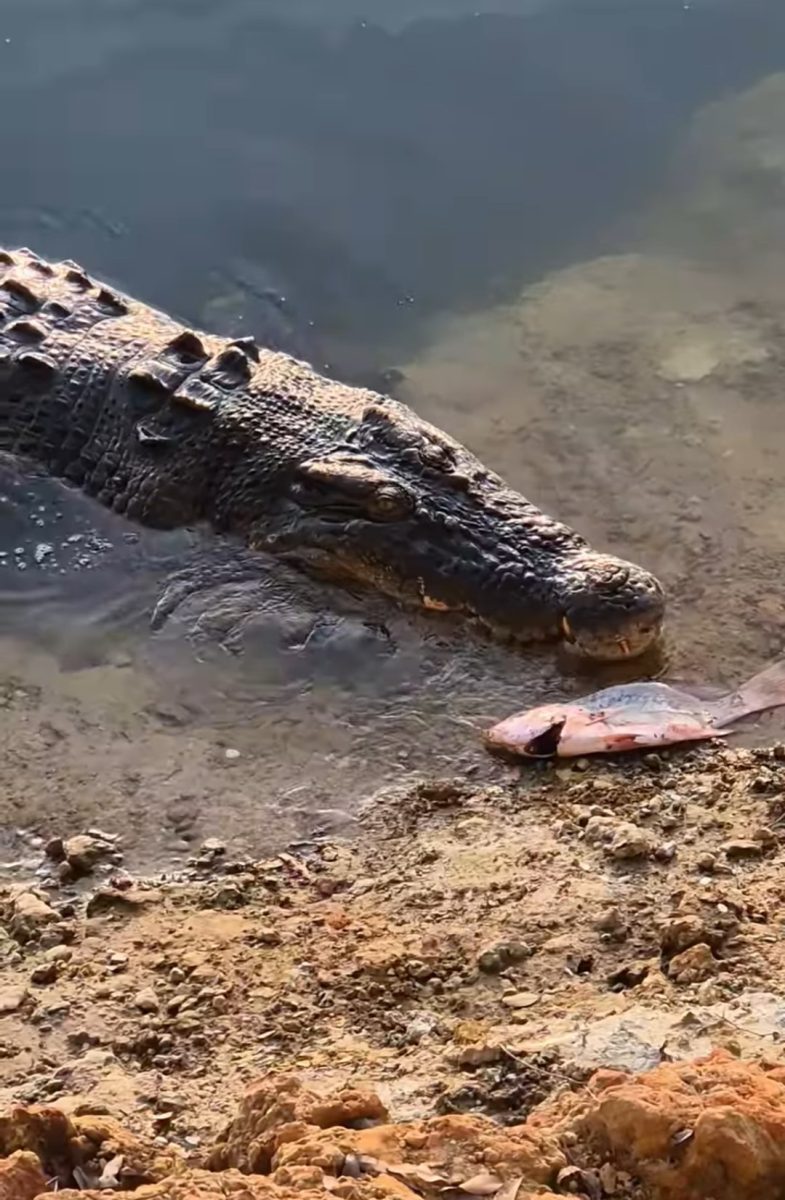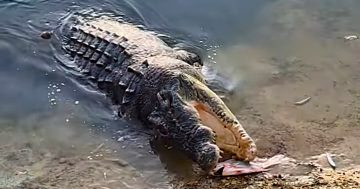
Recent social media footage showed the saltwater crocodile that fatally attacked a 40-year-old New South Wales man was being regularly fed at the same Annan River location as the tragedy. Photo: Supplied.
Unintentionally feeding a crocodile could now land you with a $6,400 fine, but not everyone agrees heavy fines and new offences are the solution.
The State Government’s increased fines and new offences announcement came after the fatal attack of New South Wales man Dr David Hogbin, 40, by a large saltwater crocodile on the Annan River last month.
Social media footage posted after the tragedy showed the same crocodile being fed fish frames at the same spot the attack on Dr Hogbin occurred.
The two new offences will now make it unlawful to unintentionally feed a crocodile by discarding food, and remain in close proximity to a crocodile.
Discarding food, including fish frames, scraps and bait, in a way that may attract crocodiles to a public place such as a boat ramp, jetty, pontoon or camping area can now result in an on-the-spot fine of $483 or a maximum court-imposed fine of $6,452.
Knowingly remaining within close proximity to a crocodile that is on, or partly on, land can now result in an on-the-spot fine of $806 or a maximum court-imposed fine of $16,130.
The government has also significantly increased penalties for existing offences which aim to deter people from engaging in behaviours that pose a serious risk to public safety and animal conservation.
The on-the-spot fine for deliberately disturbing or feeding crocodiles has increased from $483 to $2,580, with the maximum court-imposed fine increasing from $6,452 to $26,615, while the fine for interfering with a crocodile trap has increased from $645 to $2,580, with the maximum court-imposed fine increasing from $19,356 to $26,615.
“These new offences and increased fines are designed to reduce the risks associated with deliberately feeding and interacting with estuarine crocodiles,” Minister for the Environment and the Great Barrier Reef Leanne Linard said.
“People may think feeding crocs or interacting with them is fun or harmless, but experience shows that doing so increases the risk to public safety.”
Katter’s Australian Party Member for Hill Shane Knuth slammed the government’s latest move, suggesting it was “nothing more than a band-aid fix”.
“The State Government has failed to manage the crocodile crisis for over a decade, and now it’s completely out of control,” he said.
“Ask anyone who regularly fishes or uses our waterways – they’ll tell you the crocodile population has exploded; no matter how Croc Wise you are, you’re under constant threat of attack.
“This is a Northern Queensland issue, and it should be managed locally, not from over 1,800km away in an ivory tower.”
Mr Knuth first introduced his Safer Waterways Bill in 2018, which the government voted against.
He said the crocodile problem has only worsened since, leading him to recently table the Crocodile Control, Conservation, and Safety Bill.
“A key component of this bill is establishing a Queensland Crocodile Authority based in Cairns, with full control over crocodile management across the state,” he explained.
“This includes a zero-tolerance policy on crocodiles in populated waterways, annual culling, and developing a crocodile industry for Indigenous communities and landowners.
“This latest announcement is just another throwaway line that does nothing to resolve the explosion in crocodile numbers and the threat to human life.”
Original Article published by Chisa Hasegawa on Cape York Weekly.




